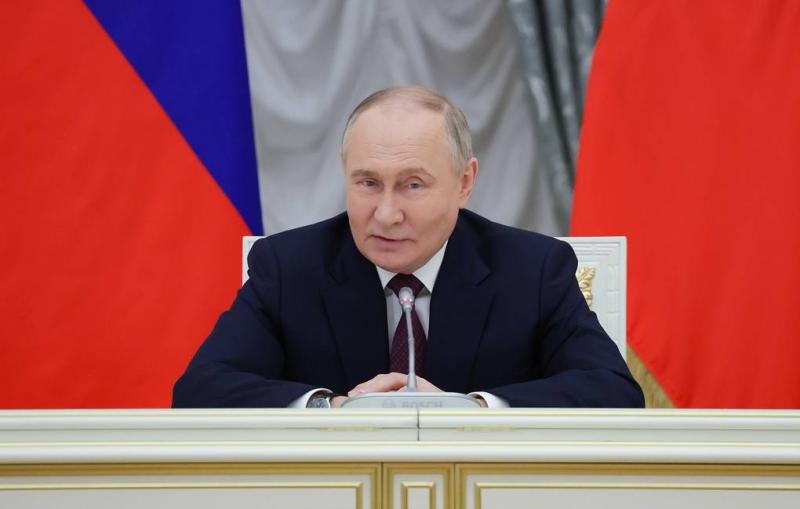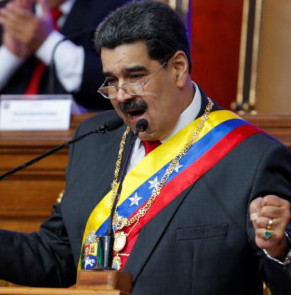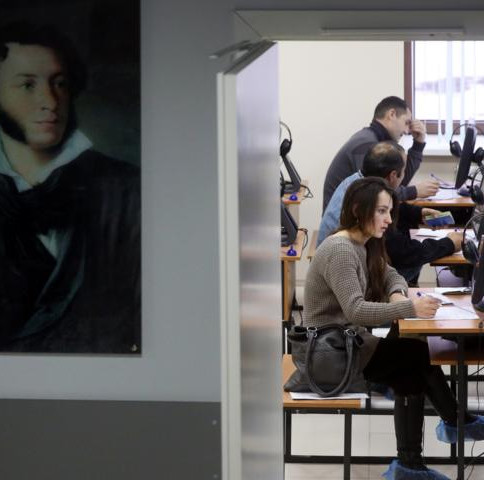
- Press review: US lets Kiev use anti-personnel mines and Iran may halt uranium enrichment
- Press review: Uranium costs soar as Moscow updates nuclear doctrine and US OKs attacks
- Press review: Russian air defenses can down Western missiles as EU conducts live exercise
- G20 leaders adopt Rio de Janeiro Summit Declaration
The outcome of the US presidential election, Russian President Vladimir Putin's meeting with new ambassadors, and ASEAN’s refusal to form a NATO-style military alliance. These stories topped the headlines in Wednesday’s newspapers across Russia, according to TASS News Agency.
Media: What’s next following US presidential election
The US presidential election was held on November 5, with security measures heightened around key government buildings, including the White House, the Capitol, the Treasury Department, and Vice President Kamala Harris’s residence. These precautions were taken in anticipation of potential mass protests and disturbances following the vote.
The tense atmosphere surrounding the election is telling, notes Rossiyskaya Gazeta. The campaign was highly polarizing, marked by personal attacks and two assassination attempts on Republican candidate Donald Trump.
"I believe there will be some minor protests, but the elite will suppress them," said Konstantin Blokhin, a leading researcher at the Russian Academy of Sciences' Center for Security Studies, in an interview with Izvestia. "If there’s any destabilization, disintegration, or what some have described as a near civil war, the elite will lose everything - both Republicans and Democrats, the US military-industrial complex, the deep state, donors, and so on. Stability will prevail. A major split in the US benefits no one."
Blokhin also stated that US society has become even more polarized since 2020, as this election is increasingly seen as "America’s last chance." This was a sentiment echoed by Trump, who repeatedly warned of power being usurped by Democrat circles. At his final pre-election rally in Michigan, a key swing state, Trump described the Democrats as an "evil system."
The intense electoral battle between Trump and Harris - as well as between their supporters and candidates for the Senate and House of Representatives - paradoxically revealed the ideological convergence and centrism of both parties’ positions, according to Yegor Toropov, an American Studies expert at the Higher School of Economics (HSE University).
"The candidates from both parties are surprisingly similar in their stance on key issues, such as tax cuts for the middle class, expanding social programs, strengthening border security, economic isolationism, and addressing cronyism," Toropov told Rossiyskaya Gazeta. "These issues, which are often seen as divisive, surprisingly unite both sides."
Toropov believes that regardless of whether Trump or Harris wins, the fundamental domestic direction of the US government and society is unlikely to change significantly. The heat of the pre-election passions will remain within the boundaries of the US legal system and is expected to subside quickly.
Izvestia: Putin discusses Ukraine, Western relations with new ambassadors
Russia is open to talks regarding the Ukrainian conflict and hopes to restore mutually beneficial cooperation with several Western countries and Japan, with whom current interactions have been limited, President Vladimir Putin said during a ceremony marking the presentation of credentials by new ambassadors at the Kremlin on November 5. He pointed to Russia’s ongoing collaboration with partner countries within BRICS as an example of fruitful engagement.
Experts surveyed by Izvestia believe that the stance of the United States - a major global power influencing the policies of its allies - remains a key obstacle to restoring ties between Moscow and the West or finding a resolution to the conflicts in Ukraine and the Middle East.
Bogdan Bezpalko, a member of the Council for Interethnic Relations under the Russian President, told Izvestia that neither Russia nor the West has yet taken any irreversible steps that would make resuming dialogue impossible.
"At this point, it is still feasible," he said. "However, most of these countries are not only unfriendly but also dependent on the influence of powerful states that shape their policies regarding Russia as confrontational. In reality, many politicians in Germany, Spain, or elsewhere would be willing to restore relations with Russia, particularly in the areas of trade and economics. Ultimately, everything depends on how quickly the conflict in Ukraine comes to an end."
Vedomosti: ASEAN countries not ready for NATO-style security pact, experts say
Creating a collective security organization in Southeast Asia akin to NATO is not feasible at this time, according to Philippine Secretary of National Defense Gilberto Teodoro, who spoke at an ASEAN (the Association of Southeast Asian Nations) security forum in Manila. He pointed to the divergent interests of regional powers and existing alliances as the main obstacles to establishing an organization similar to the North Atlantic Treaty Organization.
While the creation of a full NATO-like military alliance in Asia is unlikely, the strengthening of bloc solidarity among US allies in the region has gained significant momentum in recent years, noted Yekaterina Koldunova, director of the ASEAN Center at Moscow State Institute of International Relations (MGIMO University). "The increased cooperation between NATO and Japan, NATO and South Korea—this cannot but concern Russia. The US has consistently promoted the idea of expanding ties with its partners in Asia, and although a fully unified military alliance is improbable, there has been some success in this direction," the expert explained.
Koldunova emphasized that a NATO-type military alliance within ASEAN remains impossible. "The association has never aimed for such a goal. Moreover, all of its members are aligned with different global partners, which complicates the development of a unified stance," she added.
ASEAN itself lacks a unified position on strategic issues, agrees Vasily Kashin, director of the Center for Comprehensive European and International Studies at the Higher School of Economics. "Countries in the region are doing everything they can to avoid being forced to choose between China and the West," he said. "For many of them, China is a crucial trade partner, and severing ties with it is simply unthinkable. Given the diverse aspirations of Southeast Asian countries, it is premature to discuss the possibility of a NATO-style military alliance among them," Kashin concluded.
Izvestia: Russia backs Iraq as venue for Syrian-Turkish reconciliation talks
Russia supports Iraq as a potential venue for normalizing relations between Syria and Turkey, Russian Ambassador to Iraq Elbrus Kutrashev told Izvestia. However, he emphasized that the main obstacle to negotiations remains the presence of Turkish troops in northern Syria, with Ankara yet to provide guarantees regarding their withdrawal.
The normalization of ties between Syria and Turkey could also follow the Astana format, Kutrashev noted. If necessary, Moscow is prepared to engage in that framework, a diplomatic source informed the newspaper.
For over five years, Russia has been working to reshape Syrian-Turkish relations within the context of the Astana process. Moscow's diplomatic efforts are based on the belief that restoring ties between the two countries would significantly contribute to resolving the Syrian crisis, particularly considering Turkey’s influence over Syria’s opposition, according to Syrian expert Mohammad Nader Al-Omari.
Al-Omari believes that if Moscow succeeds in facilitating direct or third-party mediation between Syria and Turkey, it would greatly aid in resolving the crisis, particularly in the areas of security and the economy.
The expert added that Russia is working to overcome obstacles for a closer rapprochement between Syria and Turkey, as such a normalization would likely force the US to withdraw its troops from Syria and foster a political process that could improve the overall situation in the country.
Nezavisimaya Gazeta: OPEC retains stable oil prices
OPEC countries have successfully prevented oil prices from falling below $70 per barrel by announcing a reassessment of their timeline for restoring production. As a result, Brent oil futures have risen above $75 per barrel. This stabilization allows the Russian Finance Ministry to ease concerns about oil and gas revenues for the budget, at least through the end of this year.
"The decision by OPEC+ has a positive impact on the market. However, it is unlikely to drive significant price growth or secure a price above $76-77.5 per barrel," said Dmitry Aleksandrov of Iva Partners.
The production cuts are set to remain in place for only a few more months, meaning their effect will be short-lived, noted Dmitry Skryabin, a portfolio manager at Alfa-Capital. He added that geopolitical factors are likely to play a more significant role in influencing prices moving forward.
TASS is not responsible for the material quoted in these press reviews









